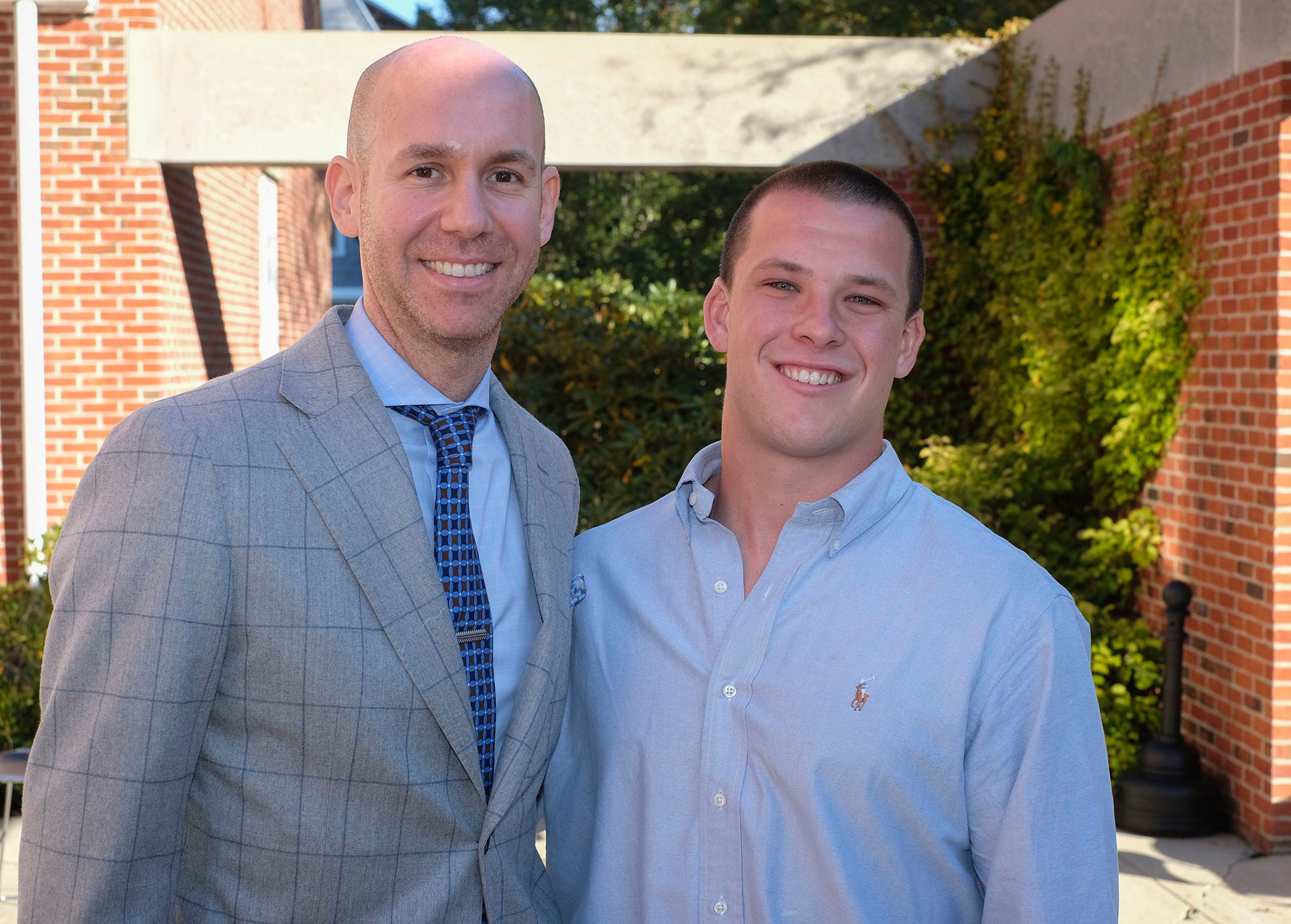KINGSTON, R.I. – Oct. 31, 2017 – Just a few weeks ago, Connor Rogers had no idea how he would pay for his final class at the University of Rhode Island.
His father died last spring after a long and debilitating illness that had confined him to a nursing home. His mother was working three jobs to keep the family afloat.
Then goodness swept in by way of a URI alumnus who also understands the pain of losing a parent at a young age. With a scholarship he created recently, Jonathan Herman gave Rogers $3,000—more than enough to reach the finish line and get his degree.
Rogers and other recipients of the Arthur and Helen Herman Scholarship Fund—named after Herman’s deceased parents—met with Herman recently on the Kingston campus to thank him.
“God bless him,” says Rogers. “It’s awesome what he’s doing. People don’t realize how hard it is to lose a parent when you’re young. It’s tough.”
Tough doesn’t begin to describe Rogers’ childhood in Monmouth Beach, a small town on the Jersey shore. When he was 5, his father Michael was diagnosed with Lupus, which ravages the immune system, and later Crohn’s disease, a chronic illness that attacks the digestive tract. In and out of hospitals, he had three heart attacks by the time Rogers reached middle school. “Some days he couldn’t get out of bed,” says Rogers. “Some days he could take me to my football game.”
A steady full-time job was an impossibility, leaving Rogers’ mother Kelly to raise the three children and pay the bills. She taught kindergarten and tutored. Summers she served eggs and bacon at a diner. The oldest, Rogers did his part to help, carrying beach chairs for members of a country club to pocket a few dollars.
His mother—adored by Rogers for her pluck and courage—told her firstborn that it was up to him to find a way to pay for college. After high school, he enrolled at a nearby community college, living at home and installing brick patios and driveways for a landscaping company to pay tuition.
Eager to continue his education, he applied to URI. His family’s credit was so bad he asked his landscaper boss to co-sign for a college loan. Instead, his boss offered to loan him the money, without interest, and Rogers agreed to work during summers and college breaks to pay off the debt. They shook hands. “I love it here,” says Rogers, who transferred to URI in 2015. “Just like home—close to the beach.”
Rogers was asleep in his off-campus apartment on a Sunday morning last April when his mother, barely able to speak between tears, called with the sad news. “I remember feeling like I got the wind knocked out of me and thinking to myself he’s actually gone,” says Rogers. “The thought of never being able to see or talk to him again was terrible.” Taking on the role as head of household again, Rogers went back to Monmouth to pick out a casket.
He could’ve folded with grief, but knew his father would object. Last spring, not long after his father’s death, he walked at the URI graduation, even though he was short four credits. Over the summer, he worked 12-hour days under a beating sun laying bricks to pay down his debt as another worry loomed: How to pay for his last URI class. “I was freaking out,” he says. “The money wasn’t there.”
One day, he got an email about Herman’s scholarship from Adam Roth, director of the Harrington School of Communication and Media, where Rogers is studying for a bachelor’s degree in communications. (Herman graduated from URI in 1999 with a degree in journalism.)
“One thing I will always remember about my father was his fight,” Rogers wrote in his application. “He was really sick for a really long time. He could have easily given in and died a long time ago, but he didn’t. He used to always tell me that seeing my brother, sister and me grow up was worth the pain and suffering he was going through. We were what kept him going.”
At the event with Herman, Rogers and the other scholarship recipients—three more this semester and three last spring—gathered around a table to share their stories of loss and tenacity. Herman’s father died when he was 4; his mother when he was 12.
“Losing a parent is probably one of the most devastating things that can happen to someone,” says Rogers. “It takes a little while to set in, then you deal with it. You never really get over it. You cope.”

